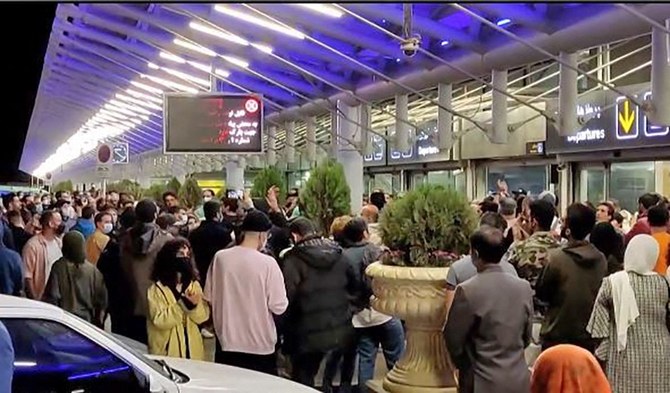PARIS: Members of the Iranian security forces raped and used other forms of sexual violence against women and men detained in the crackdown on nationwide protests that erupted from September 2022, Amnesty International said Wednesday.
Amnesty said in a report it had documented 45 such cases of rape, gang rape or sexual violence against protesters. With cases in more than half of Iran’s provinces, it expressed fear these documented violations appeared part of a “wider pattern.”
“Our research exposes how intelligence and security agents in Iran used rape and other sexual violence to torture, punish and inflict lasting physical and psychological damage on protesters, including children as young as 12,” Amnesty’s secretary general Agnes Callamard said.
The London-based organization said it had shared its findings with the Iranian authorities on November 24 “but has thus far received no response.”
The protests began in Iran in September 2022 after the death in police custody of Mahsa Amini, 22. Her family says she was killed by a blow to the head but this has always been disputed by the Iranian authorities.
After rattling Iran’s clerical leadership, the movement lost momentum by the end of that year in the face of a fierce crackdown that left hundreds dead, according to rights activists, and thousands arrested, according to the United Nations.
Amnesty said 16 of the 45 cases documented in the report were of rape, including six women, seven men, a 14-year-old girl, and two boys aged 16 and 17.
Six of them — four women and two men — were gang raped by up to 10 male agents, it said.
It said the sexual assaults were carried out by members of the Revolutionary Guards, the paramilitary Basij force, agents of the intelligence ministry, as well as police officers.
The rapes on women and men were carried out with “wooden and metal batons, glass bottles, hosepipes, and/or agents’ sexual organs and fingers,” it said.
As well as the 16 rape victims, Amnesty said it documented the cases of 29 victims of other forms of sexual violence such as the beating of breasts and genitals, enforced nudity, and inserting needles or applying ice to men’s testicles.
It said it collected the testimony through interviews with the victims and other witnesses, conducted remotely via secure communications platforms.
“The harrowing testimonies we collected point to a wider pattern in the use of sexual violence as a key weapon in the Iranian authorities’ armory of repression of the protests and suppression of dissent to cling to power at all costs,” said Callamard.
One woman, named only as Maryam, who was arrested and held for two months after removing her headscarf in a protest, told Amnesty she was raped by two agents during an interrogation.
“He (the interrogator) called two others to come in and told them ‘It’s time’. They started ripping my clothes. I was screaming and begging them to stop.
“They violently raped me in my vagina with their sexual organs and raped me anally with a drink bottle. Even animals don’t do these things,” she was quoted by the group as saying.
A man named as Farzad told Amnesty that plain clothes agents gang raped him and another male protester, Shahed, while they were inside a vehicle.
“They pulled down my trousers and raped me. I couldn’t scream out. I was really being ripped apart... I was throwing up a lot, and was bleeding from my rectum when I went to the toilet,” said Farzad who was released without charge a few days later.
Amnesty said most victims did not file complaints against the assault for fear of further consequences, and those who did tell prosecutors were ignored.
“With no prospects for justice domestically, the international community has a duty to stand with the survivors and pursue justice,” said Callamard.
Detained Iran protesters raped, sexually assaulted: Amnesty
https://arab.news/wumng
Detained Iran protesters raped, sexually assaulted: Amnesty

Syria arrests group behind Mezzeh airport attacks, weapons traced to Hezbollah

- Authorities seized a number of drones the group was preparing to use in further operations
DAMASCUS: Syria said on Sunday it had detained a group behind recent rocket attacks on the Mezzeh military airport in Damascus, with investigators tracing the weapons to Iran-backed Hezbollah.
The interior ministry said security units arrested all members of the group, which it said had carried out several strikes on the airport in recent months, after surveillance of suspected launch sites in several areas of the capital.
The weapons used in the attacks originated from Lebanon’s Hezbollah, an ally of former President Bashar Assad that once had a large military presence across Syria supporting Assad’s army, the ministry said.
Hezbollah denied the allegations and said it had no activity or ties with any group inside Syria. Authorities said they also seized a number of drones the group was preparing to use in further operations.
The ministry said only that the detainees had links to unidentified “foreign entities,” without mentioning Hezbollah or Iran.
Reuters reported in November that Washington was planning to establish a military presence at an air base in Damascus to help enable a security pact that Washington is brokering between Syria and Israel. The government denied the report.
Security sources say Hezbollah left behind weapons stockpiles, including drones, in parts of Syria after withdrawing its forces following the collapse of Assad’s rule.














